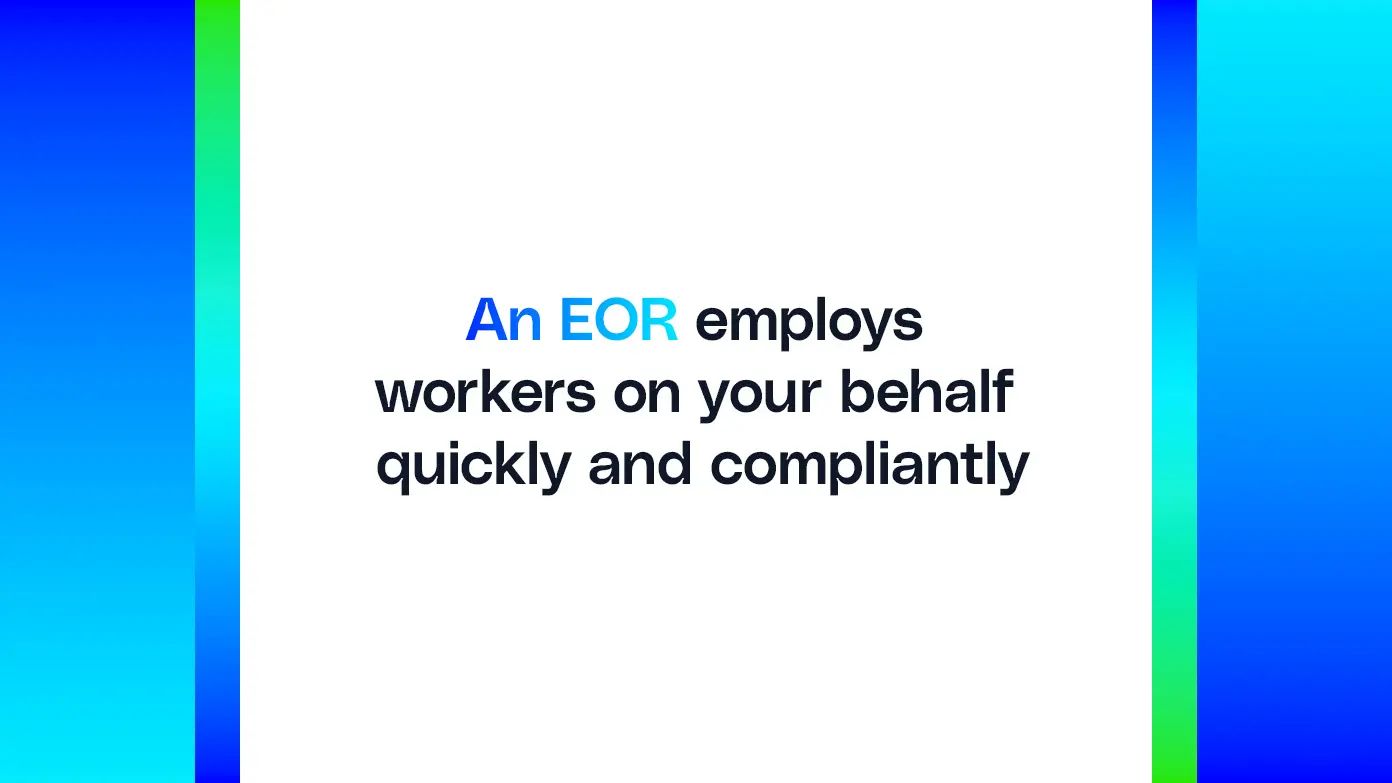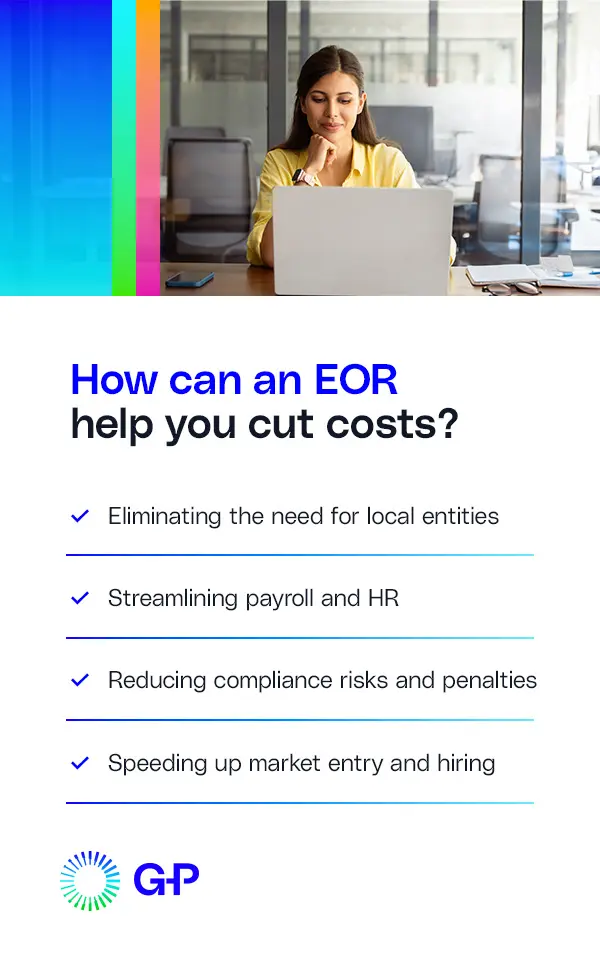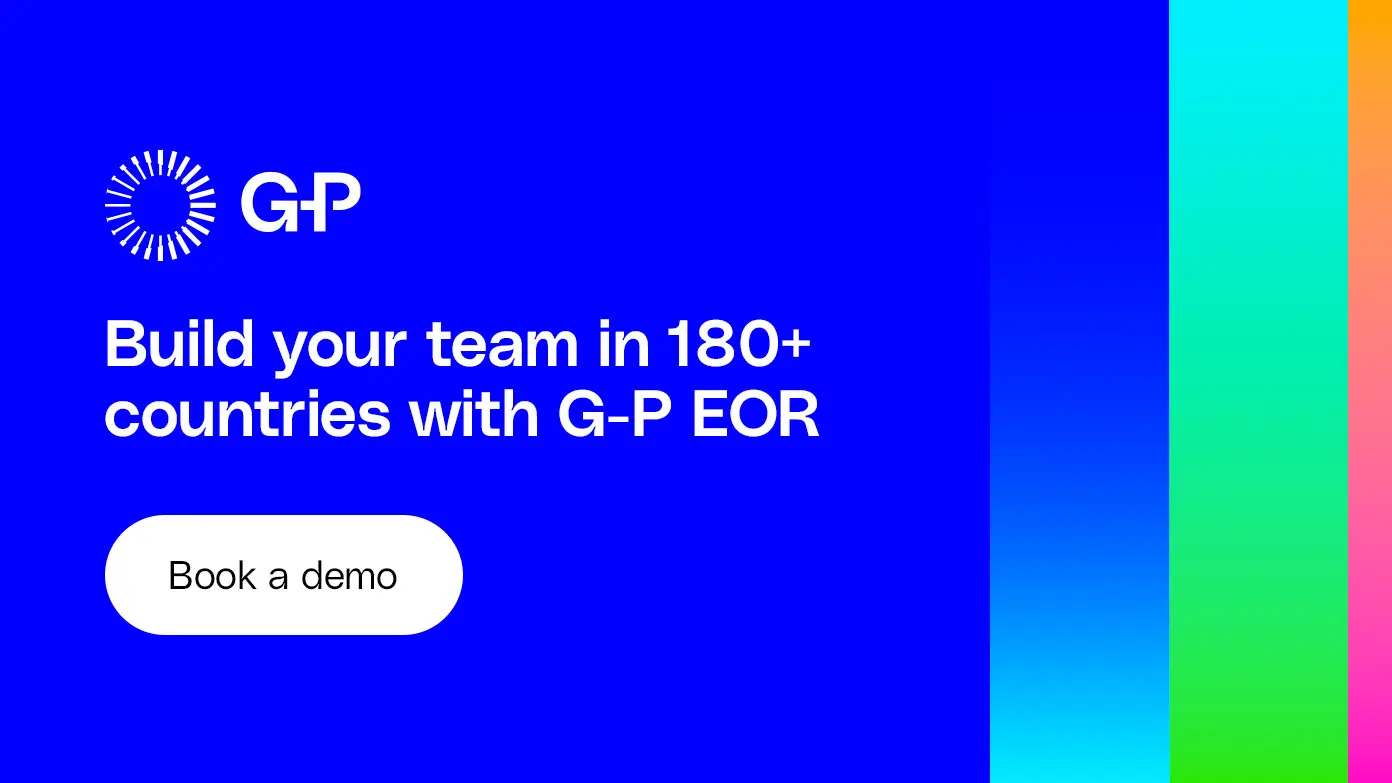Successful expansion starts with choosing the right hiring model. Two popular options are partnering with an employer of record (EOR) or working with a staffing agency.
An EOR allows you to hire international talent without setting up a legal entity. The EOR handles compliance, payroll, benefits, and contracts, lowering risk and speeding up onboarding. A staffing agency connects you with candidates and generally supports short-term, project-based engagements.
Let’s explore the differences between an EOR and a staffing agency, and the benefits of each approach.
What is an EOR?
An EOR is a third-party organization that legally employs workers on your behalf so you can hire globally without setting up a legal entity.
An EOR:
-
Manages onboarding and offboarding
-
Reduces overhead by streamlining payroll and benefits administration
-
Minimizes compliance risks
-
Handles tax withholding and filing
-
Aligns employment contracts and conditions with labor regulations in each jurisdiction

What are the benefits of using an EOR?
Unlike a staffing agency, an EOR such as G-P™ handles all legal and administrative responsibilities associated with employment. This time-saving element benefits businesses looking to expand into a new market quickly and compliantly.
In addition to streamlining HR functions, an EOR also manages compliance with local employment laws that vary from country to country. Other benefits of partnering with an EOR include:
-
No local entity requirements: Setting up an entity or subsidiary in another country can be time-consuming and expensive. G-P created the EOR industry to give companies of all sizes a way to hire globally without the hassle of entity setup. A best-in-class EOR will also have a contractor offering so you can fill temporary or project-based roles too.
-
Legal responsibility: An EOR stays up to date on local and international employment laws.
-
HR administration: An EOR solution manages payroll, benefits, and other HR responsibilities — so you don’t have to.
-
Ongoing support: An EOR offers 24/7 guidance from regional HR and legal experts.
-
Always-on compliance: EORs take on complex compliance challenges, empowering you to hire anywhere with peace of mind.
G-P EOR minimizes the cost, complexity, and risk of global employment. You can hire, onboard, and manage top talent in 180+ countries, without setting up an entity. G-P EOR offers:
-
Contractor conversion
-
Global mobility
-
Benefits administration
-
Contract generation
-
Reporting and analytics
-
Visa support
-
HR lifecycle management
-
Real-time AI guidance with G-P Assist
How does a staffing agency work?
A staffing agency, also known as a temporary agency or employment agency, matches employers with candidates. They support recruiting and screening to fill temporary, temp-to-hire, or permanent roles. Staffing agencies act as intermediaries between job seekers and employers. They handle job descriptions, interviews, resume exchanges, and feedback. Some agencies also directly employ the professionals but it’s generally for project-based assignments or temporary work.
Benefits of staffing agencies
Staffing agencies give you a fast way to find talent. They specialize in connecting businesses with qualified candidates across roles and industries, delivering these benefits:
-
Fast hiring for short-term needs: Agencies maintain ready-to-work candidate pools, allowing you to fill temporary or project-based roles in days rather than weeks.
-
Access to a wide talent pool: Their networks reach active job seekers and passive candidates, expanding options beyond direct applications.
-
Recruitment expertise: Agencies understand market trends, salary benchmarks, and candidate expectations, improving match quality.
-
Reduced internal workload: Agencies manage advertising, screening, and the initial interviews, freeing up internal teams for strategic priorities.
-
Flexible workforce solutions: A staffing agency provides temporary and direct hire arrangements, letting you scale according to your needs.

What are the differences between an EOR and a staffing agency?
An EOR and a staffing agency differ in terms of their role and responsibilities. An EOR acts as the legal employer for your company and manages everything from hiring and onboarding to global payroll and offboarding. A staffing agency’s main focus is talent sourcing. The agency's responsibility typically ends once you hire the candidate. But if the staffing agency directly employs the worker, they remain responsible for the employment-related obligations.
Both EOR solutions and staffing agencies help companies connect with talent, but they serve different purposes and work under different frameworks. Top differences include:
|
|
Employer of record |
Staffing agency |
|
Role |
Manages the entire employee lifecycle and provides ongoing HR support |
Connects you with potential candidates, but services typically end post-hire |
|
Legal responsibility and compliance |
Acts as the legal employer and ensures compliance with local labor and tax laws |
You remain legally responsible for employee HR needs and compliance (unless the staffing agency employs the worker) |
|
Legal entity requirement |
No local entity required |
Legal entity required |
|
Hiring |
Enables data-driven decisions with market insights and employer burden calculations |
Advises on talent availability and recruitment channels in specific markets |
|
Control |
Handles compliance needs, but you manage the employee's day-to-day tasks |
You manage compliance, daily operations, and the employee's day-to-day tasks |
|
Payroll and benefits |
Streamlines payroll, benefits administration, and other HR responsibilities |
Generally doesn't handle payroll or benefits for the talent they source |
|
Employment scope |
Offers flexibility to hire contractors or employees |
Generally fills contract positions but can support both worker types |
|
Geographic coverage |
Lets you hire in 180+ countries, without the need for entity setup |
Only focuses on local or regional talent markets where you have an established entity |
|
Engagement length |
Forms a long-term relationship with your company |
Specializes in short-term, seasonal, or project-based needs |
Cost analysis for an EOR vs. a staffing agency
Staffing agencies usually charge a one-time placement fee of 15–30% of the candidate's annual salary. EORs usually charge a monthly flat fee per employee. Fees vary based on location and services. This fee covers all services, from employment administration to legal compliance and payroll. An EOR gives you predictable costs and reduces administrative overhead. How can an EOR help you cut costs?
An EOR can lower overall workforce costs by:
-
Eliminating the need for local entities: You can save hundreds of thousands in subsidiary setup costs in the first year.
-
Streamlining payroll and HR: EORs simplify cross-border payments, so you can handle payroll, bonuses, commissions, and exceptions in just a few clicks. And local HR expertise gives your company insight into cultural expectations, market trends, and competitive compensation structures.
-
Reducing compliance risks and penalties: The EOR manages all employer responsibilities, such as payroll, taxes, benefits, employment contracts, and local labor law compliance, making it a stress-free global hiring solution.
-
Speeding up market entry and hiring: By bypassing entity setup, you can focus on new opportunities, get deliverables done faster, and enter new markets in a fraction of the time.
Is a staffing agency more expensive than an EOR solution?
Staffing agencies may be more expensive than EOR solutions because of their fee structure. For short-term, localized, or project-based needs, they can be cost-competitive. You can also use your EOR solutions provider to find short-term workers. An EOR helps you find the right talent and manage your team long-term.
When to choose an EOR or a staffing agency
The right model depends on your workforce goals, location strategy, and compliance needs. EORs and staffing agencies can connect you to talent, but each thrives in different scenarios.
An EOR is better if:
-
You're expanding globally and need to hire in countries where you don't have a legal entity.
-
You want to lower compliance risks and mitigate legal penalties in unfamiliar jurisdictions.
-
You want to streamline payroll, benefits, and HR across multiple countries.
-
Your business wants long-term, stable employment relationships with global talent.
-
Your company wants predictable, transparent workforce costs with faster market entry.
-
You have limited in-house HR or legal resources to manage complex global employment needs.
A staffing agency is better if:
-
Your company needs to quickly fill short-term, temporary, or project-based roles.
-
You need a network to reach active job seekers.
-
Your business only wants to outsource the recruitment process.
Build your team in 180+ countries with G-P EOR
Unlike staffing agencies, EORs support the entire employee lifecycle. They manage critical aspects like payroll, benefits administration, and compliance with local labor laws. This holistic approach gives you a hassle-free hiring solution so you can focus on growth without getting bogged down in administrative details.
As the recognized leader in global employment, G-P helps companies of all sizes hire, onboard, and manage global teams in 180+ countries, regardless of entity status. Our AI-powered global employment products and EOR solutions are backed by the largest team of in-country HR, legal, and compliance experts to streamline and simplify the entire global employment lifecycle.
If you're ready for global expansion, book a demo today.






















